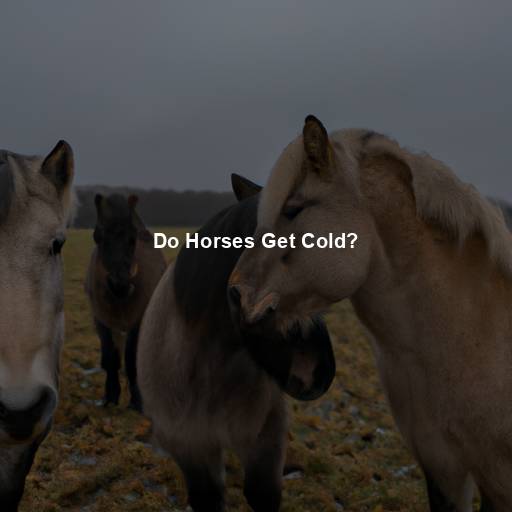Do Horses Get Cold?
Last Updated on July 21, 2023 by Evan
Contents [hide]
- 1 Understanding the Thermoregulation of Horses
- 2 Factors Affecting Horses’ Cold Tolerance
- 3 Protecting Horses from the Cold
- 4 Signs of Cold Stress in Horses
- 5 FAQs: Do Horses Get Cold?
- 5.1 Can horses get cold?
- 5.2 How do I know if my horse is feeling cold?
- 5.3 How can I keep my horse warm during the winter?
- 5.4 Should I use blankets or rugs to keep my horse warm?
- 5.5 Can I exercise my horse in cold weather?
- 5.6 Are there any health risks associated with cold weather for horses?
- 5.7 Should I adjust my horse’s diet during the colder months?
- 5.8 Are certain horse breeds more resistant to the cold?
Understanding the Thermoregulation of Horses
The Marvelous Equine Coat
There’s something truly awe-inspiring about the way horses tackle Mother Nature’s wildest mood swings. Their coats, oh their magical coats, transform into intricate weather-fighting armor! With each unique breed, season, and even personal quirks, horses craft their own fluffy masterpiece of insulation. When winter’s icy breath comes knocking, these majestic creatures conjure up a thick, luxurious coat to resist the cold’s icy advances, ensuring their body heat stays intact.
Shedding Light on Shedding
As nature’s rhythm dances with the shifting of seasons, horses embark on a wondrous transformation, shedding their winter coats to reveal a newfound elegance. This mystical process, often coined as “blowing the coat,” serves as their sacred passage into the realm of warmer temperatures. With the lengthening of daylight, a mystical symphony of hormones orchestrates this metamorphosis, beckoning the body to cast off its insulation of excess hair. Yet, it is vital to recognize that this enchanting endeavor unfolds uniquely for each equine companion, as some gracefully shed through the layers with swiftness, while others embark on a more deliberate and measured journey.
The Role of Body Fat
Body fat also plays a crucial role in a horse’s ability to stay warm. Fat acts as an additional layer of insulation, helping horses conserve body heat during colder months. Horses with a healthy body condition and appropriate fat reserves are better equipped to withstand low temperatures. However, it’s essential to strike a balance, as excessive weight gain can lead to health issues such as obesity and laminitis.
Factors Affecting Horses’ Cold Tolerance
The Power of Acclimatization
Horses, those majestic creatures in the animal kingdom, possess an astonishing knack for adapting to their surroundings. As if by magic, these four-legged beauties can acclimate themselves to colder climates over time, showcasing their resilience against the icy grip of winter. This remarkable transformation involves intricate physiological adjustments, like promoting blood circulation to their extremities and sprouting a thicker coat to shield them from the biting cold. Yet, when faced with sudden and drastic shifts in temperature, particularly from a cozy warmth to a bone-chilling frost, our equine friends encounter perplexing obstacles that demand extra precautions and attentive care.
Age and Health Considerations
Age and overall health also play a role in a horse’s ability to tolerate the cold. Older horses, just like elderly humans, may have a harder time regulating their body temperature due to reduced muscle mass and decreased metabolic efficiency. Similarly, horses with underlying health issues or compromised immune systems may be more susceptible to the cold. Providing extra care and monitoring during colder months is essential for these vulnerable equines.
Wind and Moisture: The Cold’s Allies
While horses have a remarkable ability to handle cold temperatures, certain environmental factors can make them more susceptible to feeling cold. Wind chill and moisture can significantly impact a horse’s ability to maintain warmth. Wind can strip away the insulating layer of hair and increase heat loss from the body. Wet conditions, such as rain or snow, can saturate the coat, reducing its insulating properties.
Protecting Horses from the Cold
Shelter is a Must
When the chill of winter sets in, it’s time to prioritize the well-being of our equine friends. As we all know, horses need a cozy sanctuary to shield them from the elements. Whether it takes the shape of a robust barn, a convenient run-in shed, or a thoughtful windbreak structure, a well-designed and meticulously maintained shelter is key. Ensuring ample ventilation not only keeps the air fresh but also prevents the accumulation of noxious gases.
Blanketing: To Blanket or Not to Blanket?
As the chill of winter settles in, horse owners find themselves immersed in a swirling debate – should horses be blanketed or not? It’s a conundrum that sparks fervent discussion on the best course of action amidst perplexing factors. Age, health, and the inherent cold tolerance of each individual equine come into play, making blanket decisions a complex interplay of variables. While blankets can offer crucial warmth for older or thinner horses, finding the delicate balance is vital.
Adequate Nutrition and Hydration
During colder months, horses require additional calories to fuel their internal heating system and maintain body temperature. Providing a balanced diet with high-quality forage and appropriate concentrates helps meet their nutritional needs. Access to clean, unfrozen water is also essential for proper hydration. Horses tend to drink less in cold weather, so it’s crucial to regularly check and break any ice that forms in water troughs or buckets.
Exercise and Social Interaction
Ah, the wonders of staying active – horses truly benefit from regular exercise in more ways than one! Not only does it help them maintain a healthy body weight, but it also works wonders for their circulation, leaving them feeling like the majestic creatures they truly are. Whether it’s through turnout or riding, the delightful art of movement generates a comforting warmth within their bodies, keeping those precious muscles cozy and ready for action. And let’s not forget the power of social interaction!
Respiratory Concerns
As the ominous winds of winter sweep across the land, our equine friends find themselves facing a curious conundrum. For in this perplexing dance between cold air and cozy confinement within barns, horses face a puzzling predicament to their respiratory well-being. Coughs echo through the stables, accompanied by nasal discharges, a symphony of snuffles and sniffles. Ah, but fear not, dear readers, for there is a glimmer of hope amidst this swirling storm of uncertainty.
Maintaining Hoof Health
When it comes to our equine friends, winter weather can prove quite the pesky adversary for their precious hooves. Moisture becomes an unexpected foe, causing a softening effect that leaves these delicate structures more vulnerable to all kinds of trouble, from damage to downright infection. And let’s not forget about the treacherous terrain that freezing temperatures and uneven ground can introduce. It’s a rollercoaster of uncertainty!
Managing Weight and Nutrition
Cold weather and the need for increased energy expenditure to stay warm can impact a horse’s weight and nutritional needs. Regular monitoring of body condition and weight is essential to ensure horses maintain a healthy weight throughout winter. Adjusting their diet to include additional calories, such as increased forage or concentrated feeds, can help meet their energy requirements. However, it’s important to consult with a veterinarian or equine nutritionist to determine the appropriate diet adjustments for individual horses.
Water Intake and Hydration
As the mercury takes a dip, horses may find themselves with a curious aversion to quenching their thirst, leaving them vulnerable to the perils of dehydration. A parched equine is no idle concern, as it invites an array of health hiccups, most notably the dreaded impaction colic. To alleviate this troublesome predicament, consider the soothing allure of warm water or the comforting embrace of heated water buckets to coax horses into replenishing their fluid reserves. Vigilantly monitoring the icy grip of freezing temperatures on water sources and guaranteeing access to pristine, unfrozen aqua is an absolute lifeline to ensure our equine companions remain properly hydrated.
Signs of Cold Stress in Horses
Shivering and Increased Respiration
As the temperatures dip, our equine companions can’t help but succumb to the chills. When the frost bites, horses masterfully reveal their discomfort with a symphony of shivers and quickened breaths. Shivering, a clever tactic employed by these majestic creatures, is nature’s way of sparking internal warmth through their graceful muscle contractions. But here’s where it gets perplexing – these gentle giants have their limits too.
Decreased Activity and Stiff Movement
Cold weather can cause horses to become less active and exhibit stiffness in their movement. They may appear reluctant to move or have a stiff gait when they do. Cold temperatures can cause muscles and joints to tighten, leading to decreased flexibility and discomfort. Providing horses with regular exercise and turnout can help alleviate stiffness and maintain their mobility.
Changes in Eating and Drinking Habits
Frigid temperatures can throw horses’ eating and drinking routines into disarray. While some may cut back on chow to conserve energy for battling the frost, others may quench their thirst not-so-thirstily. It’s an equestrian puzzle, really. That’s why keeping a watchful eye on their munching mood and water consumption is vital to crack the codes of chilly stress and potential health hiccups.
Coat Fluffing and Postural Changes
Have you ever noticed how horses seem to have their own cozy ways of dealing with the cold? In the midst of winter, these majestic creatures have a fascinating trick up their sleeves – or rather, under their coats. When the temperature drops, they transform into fluffy beings, fluffing up their winter coats to create a natural insulation system. This clever technique allows them to trap heat and create a snug layer of warmth close to their skin.
FAQs: Do Horses Get Cold?
Can horses get cold?
Yes, horses can indeed get cold. Although they are well-equipped to handle lower temperatures due to their natural fur coat, extreme cold weather conditions can still pose a risk to their health and well-being.
How do I know if my horse is feeling cold?
As horse owners, we are always striving to ensure our equine companions are in optimal health and comfort. When the colder weather sets in, it becomes even more important to be attuned to their needs. Keep an eye out for subtle yet telling signs like shivering, seeking warmth in the company of other horses, seeking shelter, seeming a bit sluggish, or displaying a sudden lack of appetite. By recognizing these indicators and understanding your horse’s typical behavior, you can take proactive measures to safeguard their wellbeing during the chillier days.
How can I keep my horse warm during the winter?
As temperatures plummet and Jack Frost makes his grand entrance, our equine companions find themselves locked in a perplexing predicament: how to keep warm amidst the frosty embrace of winter. Fear not, dear equestrians, for we have curated a burst of wisdom to navigate this chilly labyrinth of horse care. Seek solace in the cozy confines of a well-insulated barn or a steadfast windbreak, shielding your noble steed from Winter’s icy grip. Nestle them comfortably upon a bed of straw or shavings, as they seek refuge from the biting nip of the cold. And do not forget the elixir of life itself: fresh water, a lifeblood crucial to staving off the icy tendrils of dehydration. Lastly, let the rhythmic dance of grooming liberate them from cumbersome mud, unruly dirt, and superfluous strands of hair, ensuring their majestic physique is safeguarded against the wintry chill.
Should I use blankets or rugs to keep my horse warm?
Using blankets or rugs can be a helpful way to keep your horse warm, especially if they are older, have a thin coat, or are clipped. However, it is important to use the correct type and weight of blanket appropriate for the weather conditions. Improper use of blankets, such as using one that is too heavy or leaving it on when the horse is sweaty, can also cause issues. Consulting with an equine professional or veterinarian can provide guidance on selecting and using blankets or rugs effectively.
Can I exercise my horse in cold weather?
Yes, horses can still be exercised during cold weather. However, it is important to warm them up properly before engaging in strenuous activity. Begin with a longer, slower warm-up period to allow their muscles and joints to adjust to the colder temperatures. After exercise, ensure your horse is cooled down adequately and dried off to prevent them from getting chilled.
Are there any health risks associated with cold weather for horses?
As winter looms and icy winds pierce through the air, it’s imperative to consider the impact of extreme cold weather on our equine companions. Harsh temperatures can trigger a myriad of health risks, leaving our horses vulnerable to respiratory ailments like bronchitis or pneumonia, dehydration caused by a decrease in water intake, frostbite painting an unwelcome canvas on exposed body parts, or even the dreaded colic resulting from reduced movement and water consumption. As guardians of these majestic creatures, it is our responsibility to remain vigilant and attentive, carefully monitoring their well-being during these frigid times and promptly seeking veterinary assistance should any concerns arise.
Should I adjust my horse’s diet during the colder months?
During colder months, horses may require adjustments to their diet to help them maintain their body temperature. Providing additional forage, such as hay or alfalfa, can generate heat through digestion. Ensure access to fresh water at all times, as horses tend to drink less in colder weather. Consulting with a veterinarian or equine nutritionist can help establish a proper diet plan for your horse’s specific needs.
Are certain horse breeds more resistant to the cold?
When it comes to our equine friends, it’s fascinating to explore how certain horse breeds have evolved to thrive in chilly climes. Think about these iconic breeds like Icelandic horses, Shetland ponies, and some hardy draft horse breeds – they’ve got it all! With their extra-thick coats, compact proportions, and strong builds, these majestic creatures are built to brave the cold like absolute champions. But here’s where it gets really interesting – even within a breed itself, each horse can have its own unique response to the frosty weather, influenced by factors like their age, health, and overall well-being. Talk about a puzzle worth exploring!






